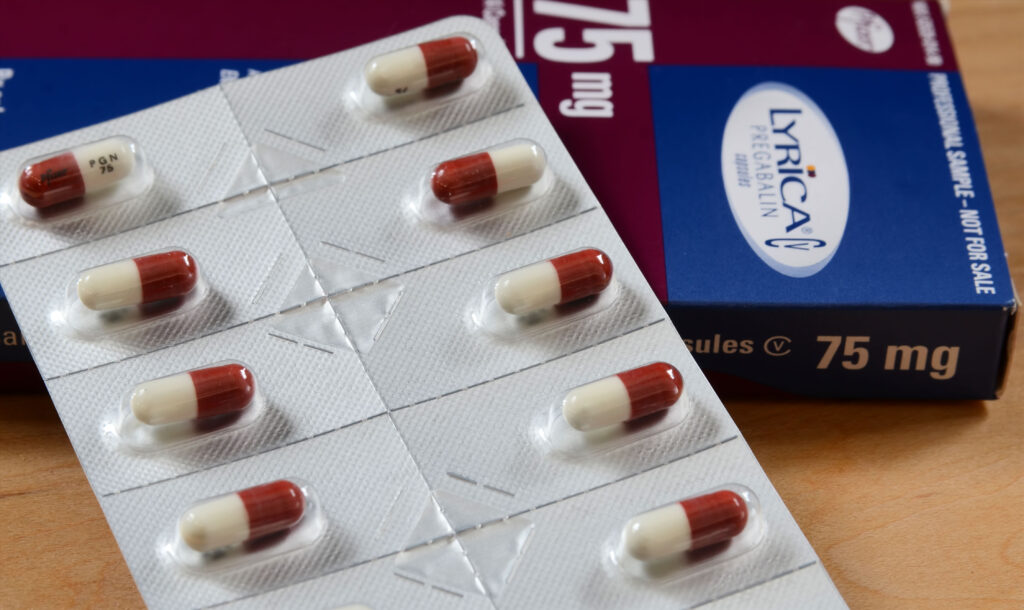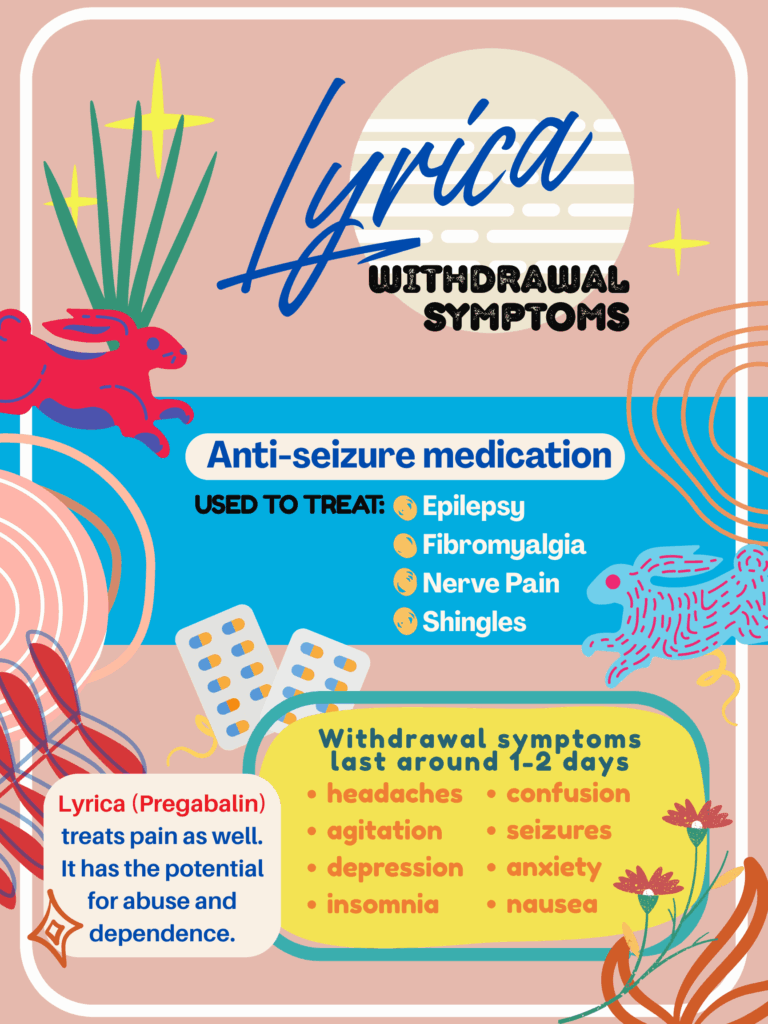Lyrica Withdrawal Symptoms
Lyrica is a powerful epileptic anti-seizure drug that, when taken and abruptly stopped, can cause Lyrica withdrawal symptoms. Lyrica has been approved to treat certain types of nerve pain and seizures stemming from health conditions like diabetes, fibromyalgia and shingles. Clinicians and researchers don’t fully understand the mechanisms behind the effects of Lyrica. Because of that, there can also be a great deal of uncertainty when it comes to withdrawal symptoms.

In 2022, an estimated $1 million patients in the US were using Lyrica. It is one of the most commonly and popularly prescribed seizure and neuropathic pain medications. The drug is a Schedule V controlled substance with the potential for abuse. When taken in high doses, it can cause a sense of euphoria. Because of the drug’s potential for abuse, it can also cause dependence, which can lead to withdrawal symptoms.
More about Lyrica
Lyrica is the brand name for the generic drug pregabalin. It is a central nervous system depressant that can treat a wide variety of ailments. It can treat neuropathic pain caused by damaged nerves due to diabetes, shingles, or spinal cord injuries. It can treat pain from fibromyalgia. It can treat partial-onset seizures in people aged 17 or older when taken with other corresponding medications. In off-label uses, it has also been prescribed to treat symptoms of anxiety.
According to the Epilepsy Foundation, Lyrica is an exception medication to add as part of treatment care combined with other anti-seizure medications. Therefore, it is often prescribed in addition to other types of medications used to treat neuropathic pain.
How does Lyrica work? The medication works by binding to the alpha2-delta site in the central nervous system. This calms down overactive or damaged nerves. These types of nerves are responsible for causing pain and seizures in the body. This allows impulses in the brain to slow down, stopping seizures right as they are about to occur or at the beginning of the action.
The drug will begin to work almost immediately after the first dose. However, it can take a few days for the full effects of the drug to be felt. The effects of the drug will last as long as you are taking the medication. It typically stays in the system between 30-35 hours after the last dose.
Lyrica Side Effects
- Dizziness – The most common side effect that can occur if you take higher doses of 300mg daily or more. This symptom can improve after a few weeks or it can last the duration of the time you take the medication. Dizziness can also be linked to a lack of balance, which leads to the risk of falling or other injuries.
- Lack of coordination
- Sleepiness – The second most common side effect that usually happens when you first start using Lyrica. It is common for those who take doses of 300mg per day or more.
- Swelling in the arms and legs
- Weight gain
- Increased appetite
- Dry mouth
- Memory issues
- Difficulty focusing
- Vision changes
- Muscle twitching
- Mood changes such as anxiety and depression
- Euphoria

Lyrica Abuse and Addiction
Lyrica is a controlled substance, which means there is a risk of dependence and developing an addiction. The risks of misuse can increase if you have a previous history of substance abuse. Some describe the feeling of a Lyrica high as comparable to that of being drunk on beer or a similar type of alcohol. Users can experience euphoria, relaxation and intense calmness.
Lyrica Withdrawal
What is Lyrica withdrawal? Going cold turkey or suddenly quitting Lyrica can cause the user to develop withdrawal. When you stop taking a drug, the changes that it made to the body will remain until the body is able to readjust. During this period of readjustment, when there is no longer a presence of the drug in the system, your body can experience decreased levels of certain types of neurotransmitters that produce feelings of calm and happiness.
Once the drug is taken and absorbed into the bloodstream, it is immediately processed. This also means withdrawal symptoms can occur just as quickly when drug use has stopped. Some people begin experiencing withdrawal symptoms within 24 hours. Most withdrawal symptoms disappear within a week or longer.
The intensity of withdrawal symptoms can become enough motivation for users to continue using the drug in order to avoid experiencing them. This just brings the user back into the cycle of addiction.
Check Your Insurance Coverage for FREE
Find out if your insurance covers addiction treatment in minutes. We accept most insurance!
Lyrica Withdrawal Symptoms
Typical withdrawal symptoms include insomnia, nausea, headaches, diarrhea, hyperhidrosis, chest pain, drug cravings, increased suicidal thoughts and behaviors, difficulty sleeping, psychosis and seizures. One of the symptoms of withdrawal, anxiety, can occur even in those who don’t have a generalized anxiety disorder.
One of the more dangerous withdrawal symptoms is respiratory depression. This is especially dangerous in people ages 56 or older, those with breathing problems or those who take other medications that can impact breathing.
Pregabalin vs Gabapentin
Pregabalin and gabapentin both fall under the category of drugs called gabapentinoids. These types of drugs are structurally similar to the neurochemical GABA, an inhibitory chemical in the body that decreases the activation of your nerve cells producing a calming effect.
They both work to decrease the release of GABA chemicals in the body. They both remain in the bloodstream for the same amount of time. The main difference in the two medications is that pregabalin can be absorbed more quickly into the body compared to gabapentin. This allows it to reach peak blood levels within an hour after the last dose, compared to the 3 hours it would take for gabapentin to do the same.
Both medications are often used for off-label purposes such as various types of nerve pain, menopause related symptoms, muscle and bone-related pain, anxiety, headache, restless leg syndrome and alcohol use disorder.
Pregabalin or Lyrica is considered a controlled substance while gabapentin is not on the list and is only controlled in some states. Lyrica is the name brand for the drug pregabalin. Gabapentin is the generic name for the brands Gralise, Horizant and Neurontin.
How to best treat and manage withdrawal
Going cold turkey off Lyrica can be dangerous. Abruptly stopping drug use or significantly decreasing drug use can cause Lyrica withdrawal symptoms. One of the most dangerous side effects of this is seizures.
Do not attempt to stop taking the drug on your own. It is best to gradually taper off the medication in order to avoid or lessen the severity of withdrawal. If care is not taken, it could even increase the number of seizures.
Reach out to Hotel California by the Sea
We specialize in treating addiction and other co-occurring disorders, such as PTSD. Our Admissions specialists are available to walk you through the best options for treating your addiction.
Treatment for Substance Use Disorder
Lyrica is a powerful and commonly used prescription medication. Because of its impact on the central nervous system, even taking Lyrica as recommended can cause dependence and addiction to the drug. Professional behavior treatment program Hotel California by the Sea provides a prescription medication treatment plan.
We offer treatment at all levels of care including detox, residential, PHP and IOP. We utilize evidence-based treatment methods such as CBT, DBT and EMDR therapy. Hotel California by the Sea is dedicated to helping clients reach their goals of sobriety and overcome their addiction.
References:
https://recovered.org/prescription-drugs/pregabalin-lyrica/withdrawal
https://www.goodrx.com/lyrica/common-side-effects
https://www.addictioncenter.com/drugs/lyrica-addiction-abuse
https://www.healthline.com/health/pregabalin-oral-capsule
https://www.goodrx.com/classes/anti-epileptics/pregabalin-vs-gabapentin
